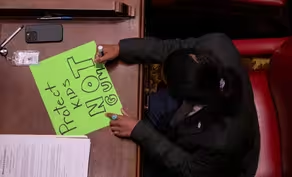
The debate over public funding for religious schools
Clip: 6/29/2024 | 8m 16sVideo has Closed Captions
Key points in the debate over public funding for religious schools
According to an analysis by The Washington Post, the vast majority of school voucher money nationwide is going to religious schools. John Yang speaks with Robert Enlow of EdChoice and Richard Katskee of Duke University's Appellate Litigation Clinic for two perspectives on the debate over religion in publicly supported schools.
Problems playing video? | Closed Captioning Feedback
Problems playing video? | Closed Captioning Feedback
Major corporate funding for the PBS News Hour is provided by BDO, BNSF, Consumer Cellular, American Cruise Lines, and Raymond James. Funding for the PBS NewsHour Weekend is provided by...

The debate over public funding for religious schools
Clip: 6/29/2024 | 8m 16sVideo has Closed Captions
According to an analysis by The Washington Post, the vast majority of school voucher money nationwide is going to religious schools. John Yang speaks with Robert Enlow of EdChoice and Richard Katskee of Duke University's Appellate Litigation Clinic for two perspectives on the debate over religion in publicly supported schools.
Problems playing video? | Closed Captioning Feedback
How to Watch PBS News Hour
PBS News Hour is available to stream on pbs.org and the free PBS App, available on iPhone, Apple TV, Android TV, Android smartphones, Amazon Fire TV, Amazon Fire Tablet, Roku, Samsung Smart TV, and Vizio.
Providing Support for PBS.org
Learn Moreabout PBS online sponsorshipJOHN YANG: This week the debate over religion and publicly supported schools has been playing out in Oklahoma.
The State School Superintendent mandated that public schools teach the Bible and 10 Commandments.
Days before, the state Supreme Court blocked what would have been the nation's first religious charter school.
While the Supreme Court has been opening the door wider for public money to flow into religious schools, a lot is already going through school voucher programs.
A Washington Post analysis concluded that nationwide, the vast majority of school voucher money is going to religious schools.
We get two perspectives on this.
Robert Enlow is president of CEO of EdChoice, a nonprofit school voucher advocacy group.
And Richard Katskee is the director of Duke University's Appellate Litigation Clinic and the former vice president of Americans United for Separation of Church and State.
Richard, let me start with you.
Should money from public school voucher programs be able to go to private religious schools?
RICHARD KATSKEE, Duke University School of Law: There are all sorts of problems with money going to private schools.
One of the big ones is that when money goes to private religious schools, those schools and by the way, all private schools that take vouchers can pick and choose which students they will allow to attend.
They won't serve kids with disabilities, because they're more expensive to go there.
They won't serve kids of different faiths.
They'll make the kids and the families sign statements of faith and agree to live according to them.
If you have an LGBTQ student, or a student whose parents are a same sex couple, the schools can say we don't want your kind here, we won't let you do that.
It's really about schools making choices not about parents making choices.
JOHN YANG: Robert Enlow, schools making choices rather than parents making choices.
What do you what do you say to that?
ROBERT ENLOW, CEO, EdChoice: What we know in history right now around America is that the courts have said that no dollar crosses the Rubicon of a private school without the truly private choice of a family.
So it's families who are choosing these options.
And here are the options they're choosing.
In Indiana and the school voucher program, more than half the kids who are attending Catholic schools are non-Catholic.
In Florida, the way they have their program with 700 new private schools has started since the beginning of the program, if you're Jewish, if you're Catholic, if you're progressive, if you want to go to the Albert Einstein Academy, which is specifically for children with LGBTQ backgrounds, or if your special needs they have special needs schools that are starting up, the vast majority of the programs and voucher programs right now, about 15 of them are specifically set up for Special Needs families.
And so, what we're finding with choice programs in America is the pluralism is actually working families are getting to choose options that are working for them.
And that's the schools that they're choosing.
It's not school choice by the schools.
It's school choice by the parents.
And the last thing I would add is, you know, our traditional schools right now, they pick and choose by a situation called economic segregation.
If you can afford a house, then you can choose.
And we also know that there are tons of magnet schools.
So the concept of choice in which schools choose is much more complex.
But we know from school choice programs right now that families are choosing, and over a million and a million of them are doing so right now.
JOHN YANG: People talk about school vouchers, money going to religious schools as public money going to religious schools.
Do you see it as public money?
Or do you see it once it gets in the parents hands as their money?
RICHARD ENLOW: So I think as taxpayers, we have decided that we want to fund the education of the public.
I think for too long, we've said we're going to fund the education on public but only through a government run school system.
What's happening now across America is we say we believe in the public funding of education, but letting parents choose where they spend those dollars.
So that's what's happening with it's why it's growing so much.
That's why it's gone from 500,000 in 2019 to a million now.
That's why there's 75 programs operating in 33 states.
And it's why out of the 52 legal cases for school choice at state level, 47 have been ruled in favor of school choice.
So, the fact is we're wanting to say that public funds, the taxpayer funds should go to families to make truly private choices, much like they do in higher ed and much like they do for a host of other government programs.
JOHN YANG: Richard, do you have any First Amendment Establishment Clause concerns about this about these voucher funds going to private religious schools?
RICHARD KATSKEE: Sure.
So look, the Supreme Court has said that if you have a system of True Private choice that where there are actually real options for people, then the money going to the parents and turning around and using it at a private religious school doesn't cause a federal constitutional problem might well cause state constitutional problems.
But it's also the case that the Supreme Court premised that idea on there being real options for everybody.
My family is Jewish, if I live in a community where there aren't any Jewish schools, yeah, sure.
Robert is right that I could send my kids to a Catholic school to get a Catholic education or a Baptist School to get a Baptist education.
But that's not really a reasonable choice for most people.
It's also a funny thing to talk about the way that the public is hungry for these programs when school vouchers have been on ballot initiatives going all the way back to about 1972.
And not a single time has the public ever voted in favor of a voucher program.
Right now in Nebraska, they put it into tuition tax credit program last year, the legislature, so the people, the public actually rose up and got the signatures to put a ballot measure for the state election to ask the question, should we get rid of that program?
The legislature, which gets a ton of money from billionaires pushing voucher agendas, turned around and made little niggling changes to the statutes so that they could say, oh, now it's not the same statute.
So you can't challenge it.
You can't bring it up in a ballot initiative.
This isn't about the public.
This is about billionaires financing an agenda that includes defunding and deconstructing taking apart the public schools and pushing a particular religious agenda that just doesn't include most Americans.
JOHN YANG: Robert, respond to that, not about the public.
It's about other agendas.
ROBERT ENLOW: So in Arizona, when the ESA Program, Education Savings Account Program passed, and everyone is then free to choose, the opponents of school choice tried to put it on the ballot to get rid of it, they failed in their attempt to do so.
And the program has grown dramatically.
What I think is most important about the potential for school choice.
And what we're seeing in places like Florida and Arizona, is you can start new schools, this incredible growth of micro schools, for example, is happening, and it's mostly non-religious, right.
So what we're finding is in school choice states that are mature like Indiana, like Arizona, like Ohio, and other places, you're beginning to see new schools start.
And that's the point, family's having more options, and more freedom to choose.
And that's what we're seeing across the country.
And we'll find out in the fall if Nebraska, and Kentucky actually show that the public can pass a referendum.
JOHN YANG: After the Supreme Court ruled that the main tuition program could not exclude religious schools, as I understand a main started using their human rights law that all schools have certain non-discrimination levels, and that if you do discriminate, you can't participate, which did knock out some of the religious, private schools.
What do you think about that?
ROBERT ENLOW: So most school choice programs already follow the title of the non-discrimination title of the U.S. Supreme Court, right?
So if you look at the laws that are created around the country, you'll see non-discrimination clauses in them across the board.
And so most private schools are already required to follow federal jurisprudence, and they do.
And if they don't, then they generally don't participate in the program.
And what I think it's important to remember here is its state legislators who are voted in by the public that are making these determinations.
And this is where the public is supporting it, because they're supporting it by hiring their state legislator to do these bills.
JOHN YANG: Robert, Richard, I'm afraid we're out of time.
We got to leave it there.
Thank you both very much.
RICHARD KATSKEE: Thank you.
ROBERT ENLOW: Thanks for having me.
How climate crisis is changing family planning in Bangladesh
Video has Closed Captions
Clip: 6/29/2024 | 6m 16s | How the climate crisis is changing family planning and reproductive health in Bangladesh (6m 16s)
How gun violence outside of schools harms millions of kids
Video has Closed Captions
Clip: 6/29/2024 | 6m 18s | Frequent gun violence near school grounds harms millions of kids, analysis finds (6m 18s)
Providing Support for PBS.org
Learn Moreabout PBS online sponsorship
- News and Public Affairs

FRONTLINE is investigative journalism that questions, explains and changes our world.

- News and Public Affairs

Amanpour and Company features conversations with leaders and decision makers.












Support for PBS provided by:
Major corporate funding for the PBS News Hour is provided by BDO, BNSF, Consumer Cellular, American Cruise Lines, and Raymond James. Funding for the PBS NewsHour Weekend is provided by...

